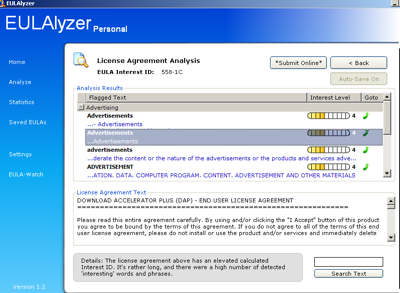



Next: TRUSTe
Up: Some Recent Suggestions for
Previous: StopBadware
Contents
EULAlyzer [Javacool Software,
2007] is a piece of concept software that takes any EULA and analyses it for
particular words and phrases considered ``interesting''. These include words and phrases involving advertising, third parties, changes
that may be made without notifying the user, privacy information, etc. When a user installs a new piece of software, they can use the
EULAlyzer software to copy an EULA into the analysis tool, which EULAlyzer scans for terms of interest, displaying the results in a
window for the user to easily scan through the pertinent phrases and work out if they are important. A screenshot of its operation can be
seen in Figure 4.2.
Figure 4.2:
A screenshot of
EULAlyzer, showing some analysis results.
|
|
In this Figure, the software license agreement
for Download Accelerator Plus [SpeedBit, 2008] has been analysed. In the upper screen, a list of suspect text is shown (``Flagged
Text''); this shows the word as well as the context of the word as it appears in the EULA itself. The user can then click on the green
arrow beside it to go straight to the pertinent spot in the EULA on the bottom half of the screen, where they can read more of the
surrounding text. The ``interest level'' shows how likely it is that the user would be interested in those pieces of text. I personally
found that gauge fairly useless, since I was interested in seeing what all of the flagged text was, rather than selectively
looking at or ignoring other phrases. The user interface screen for choosing the EULA to read was a little difficult to use, since the
window of the EULAlyzer couldn't be resized easily and the program requires the user to drag an icon from the EULAlyzer program to the
text box of the license agreement on the installation screen of the software in question. Dragging the icon and completing the procedure was difficult, and is likely to be discouraging for users of the free version of the program. Since the point of such a program would, ideally, be for it to be easy to use in order to encourage use and therefore improve understanding and knowledge of the contents of EULAs, the free version of EULAlyzer is not the best solution to the problem of EULAs.
There is a more advanced version of the software (which requires payment; the simpler version is free) that runs continuously in the
background, and analyses any licenses that the user encounters when installing software. This is much easier to use, since the user
doesn't have to open the program to run the EULA through it each time they install software (which would mean they could easily become
lazy and not bother to actually do it). It also only runs on one platform (Microsoft Windows) and is thus not very useful for Macintosh
or Unix/Linux users. If this or a similar program became standard on all operating system platforms, then it would be much more useful,
but as it is, it is simply a niche market application that appeals to the more privacy and security conscious computer users.
EULAlyzer provides a simple service that does make it easier for users to understand the contents of the license agreement. However, it
is essentially a patch approach to the more systemic problem of informed consent in EULAs, and although it is quite useful, it doesn't
attempt to change the poor behaviour of companies, but simply provides a slightly more convoluted option to users concerned about their
computer and data's welfare. Since it is also analysing the EULA documents by scanning for certain words, it could also ultimately be a reasonable expectation that software wishing to avoid clauses being flagged by the analysis could rewrite their EULA to use words that do not trigger an alert in the software. EULAlyzer would then give a false sense of security, and could ultimately be more dangerous than not having the analysis tool at all. Thus it doesn't really effect much change in the world of poor EULAs, and it will likely be a minority of
people who actually use the software4.3, which is why it is not a comprehensive and full answer to the
problem of EULAs.




Next: TRUSTe
Up: Some Recent Suggestions for
Previous: StopBadware
Contents
Catherine Flick
2010-02-03
